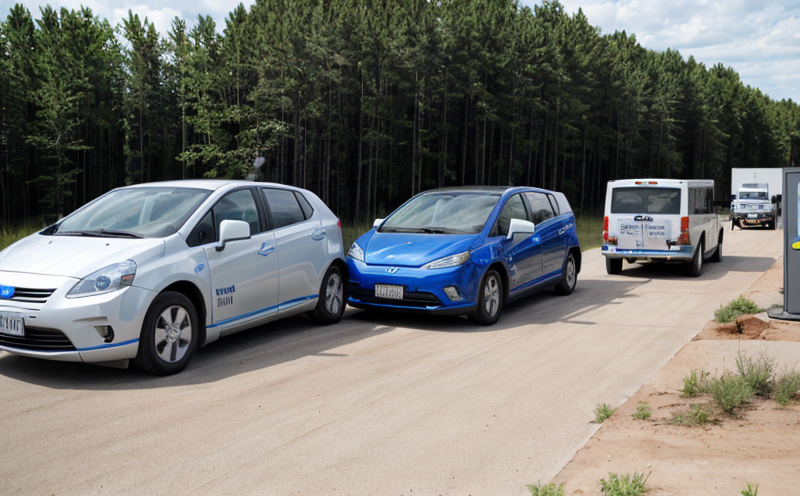SAE J2601 Hydrogen Fueling Protocol Testing for Fuel Cell Systems
The SAE J2601 hydrogen fueling protocol is a critical standard that ensures the safe and efficient operation of hydrogen fuel cell systems. This protocol addresses the unique challenges associated with hydrogen fueling, including pressure, temperature, and flow rate control, all while minimizing the risk of accidents during the refueling process.
Hydrogen fuel cells are essential components in the transition towards cleaner energy sources, especially for transportation and stationary applications like power generation. Ensuring that these systems meet stringent safety and performance standards is paramount to their widespread adoption. The SAE J2601 protocol provides a framework that guarantees compatibility between hydrogen dispensers and fuel cell vehicles or systems.
At Eurolab, our team of experts utilizes cutting-edge equipment and methodologies to perform SAE J2601 hydrogen fueling protocol testing with precision and reliability. Our facilities are equipped with state-of-the-art fueling stations capable of simulating real-world conditions for a variety of vehicle models, ensuring that all aspects of the refueling process adhere to the specified standards.
Our testing process begins with thorough pre-test preparation, which includes verifying the integrity and functionality of both the hydrogen dispenser and the fuel cell system. This step is crucial in identifying any potential issues before they can affect test results or compromise safety. Once the equipment has been verified, we proceed to conduct a series of tests that replicate the actual refueling process as outlined by SAE J2601.
The protocol mandates specific parameters such as pressure, temperature, and flow rate to ensure optimal performance during the fueling event. Our testing apparatus allows us to precisely control these variables within narrow tolerances, ensuring accurate measurement of the fuel cell's response under various conditions. This level of control is essential for identifying any discrepancies or deviations from expected behavior.
After completing the refueling process, we perform additional tests to evaluate the system’s recovery time and stability. These metrics are critical in assessing the reliability and efficiency of the hydrogen fueling infrastructure. By simulating real-world scenarios, our tests provide valuable insights into how well these systems can handle unexpected situations or fluctuations in demand.
Our commitment to quality and accuracy extends beyond mere compliance with SAE J2601; we strive to push the boundaries of what is possible within this field. Our extensive experience allows us to offer innovative solutions tailored specifically for your unique needs. Whether you're developing new technologies or optimizing existing ones, our expertise can help you achieve optimal results.
- Enhanced Safety: By adhering strictly to SAE J2601 guidelines during testing, we ensure that your fuel cell systems meet the highest safety standards.
- Improved Efficiency: Our thorough testing process helps identify inefficiencies and areas for improvement in your hydrogen fueling protocols.
Benefits of SAE J2601 Hydrogen Fueling Protocol Testing
Conducting comprehensive SAE J2601 testing offers numerous advantages that contribute to the success and reliability of hydrogen fuel cell systems. Firstly, it ensures compliance with international standards, which is essential for regulatory approval and market acceptance. Secondly, by simulating actual refueling scenarios, we can uncover potential weaknesses in your system design or operational procedures.
Moreover, this testing helps establish a baseline for performance metrics that can be used to track improvements over time. This data-driven approach enables continuous optimization of both hardware and software components, leading to more efficient and cost-effective solutions. Lastly, participating in these tests demonstrates your commitment to excellence and innovation within the industry.
- Regulatory Compliance: Adherence to SAE J2601 ensures that you meet all necessary regulatory requirements.
- Data-Driven Decisions: Robust testing provides actionable insights for ongoing improvement and refinement.
Eurolab Advantages in SAE J2601 Hydrogen Fueling Protocol Testing
At Eurolab, we pride ourselves on offering unparalleled expertise and advanced facilities dedicated to hydrogen fuel cell testing. Our experienced staff leverages extensive knowledge of the latest technologies and methodologies to deliver precise and reliable results every time.
We invest heavily in maintaining our state-of-the-art equipment and infrastructure, ensuring that it remains at the forefront of technological advancements. This commitment translates into superior test accuracy and repeatability, giving you confidence in the quality and integrity of your data.
Additionally, Eurolab maintains strong relationships with leading academic institutions and industry partners, allowing us to stay ahead of emerging trends and best practices. We continuously update our protocols based on feedback from clients and updates in international standards like SAE J2601.
The combination of our skilled personnel, sophisticated equipment, and up-to-date methodologies makes Eurolab the ideal partner for your hydrogen fuel cell testing needs. Partnering with us allows you to focus on innovation while leaving the technical aspects to experts who understand both current challenges and future possibilities.
Competitive Advantage and Market Impact
The ability to accurately test hydrogen fueling protocols according to SAE J2601 gives you a distinct competitive edge in the marketplace. Compliance with this standard not only satisfies regulatory requirements but also enhances your product’s reputation for reliability and safety.
By demonstrating adherence to stringent international standards, you signal to potential customers that they can trust your products to perform consistently across diverse environments and conditions. This trust fosters stronger brand loyalty and customer satisfaction, ultimately translating into increased market share.
In today’s competitive landscape, being able to showcase compliance with cutting-edge protocols like SAE J2601 sets you apart from competitors who may not prioritize such rigorous testing methods. It positions your company as a leader in the hydrogen fuel cell sector and contributes positively towards fostering industry growth and development.
- Enhanced Reputation: Demonstrating compliance with SAE J2601 strengthens customer confidence in your products’ reliability and safety.
- Increased Market Share: Showing commitment to high standards attracts more buyers, thereby boosting sales performance.





